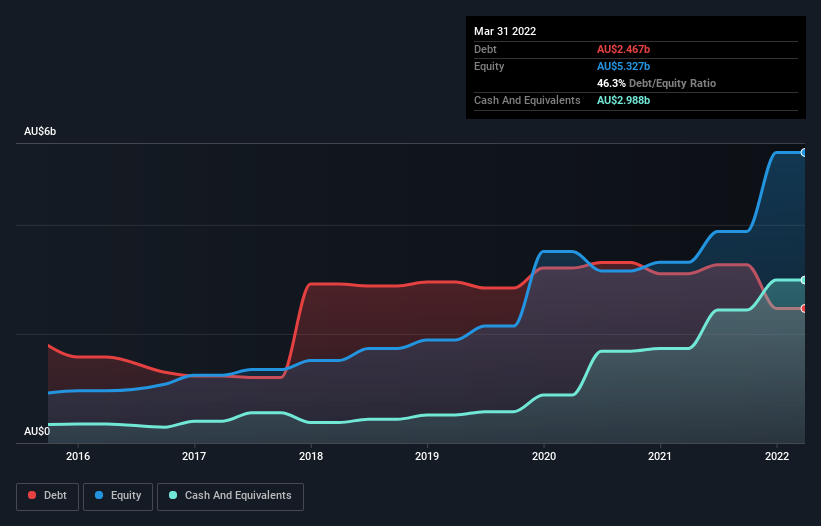Aristocrat Leisure (ASX:ALL) Seems To Use Debt Rather Sparingly
The external fund manager backed by Berkshire Hathaway's Charlie Munger, Li Lu, makes no bones about it when he says 'The biggest investment risk is not the volatility of prices, but whether you will suffer a permanent loss of capital.' So it might be obvious that you need to consider debt, when you think about how risky any given stock is, because too much debt can sink a company. We can see that Aristocrat Leisure Limited (ASX:ALL) does use debt in its business. But the more important question is: how much risk is that debt creating?
Why Does Debt Bring Risk?
Generally speaking, debt only becomes a real problem when a company can't easily pay it off, either by raising capital or with its own cash flow. In the worst case scenario, a company can go bankrupt if it cannot pay its creditors. However, a more usual (but still expensive) situation is where a company must dilute shareholders at a cheap share price simply to get debt under control. Of course, the upside of debt is that it often represents cheap capital, especially when it replaces dilution in a company with the ability to reinvest at high rates of return. When we think about a company's use of debt, we first look at cash and debt together.
Check out our latest analysis for Aristocrat Leisure
How Much Debt Does Aristocrat Leisure Carry?
As you can see below, Aristocrat Leisure had AU$2.47b of debt at March 2022, down from AU$3.10b a year prior. But it also has AU$2.99b in cash to offset that, meaning it has AU$521.0m net cash.
How Healthy Is Aristocrat Leisure's Balance Sheet?
We can see from the most recent balance sheet that Aristocrat Leisure had liabilities of AU$1.07b falling due within a year, and liabilities of AU$2.83b due beyond that. Offsetting these obligations, it had cash of AU$2.99b as well as receivables valued at AU$859.9m due within 12 months. So these liquid assets roughly match the total liabilities.
This state of affairs indicates that Aristocrat Leisure's balance sheet looks quite solid, as its total liabilities are just about equal to its liquid assets. So while it's hard to imagine that the AU$24.2b company is struggling for cash, we still think it's worth monitoring its balance sheet. While it does have liabilities worth noting, Aristocrat Leisure also has more cash than debt, so we're pretty confident it can manage its debt safely.
Better yet, Aristocrat Leisure grew its EBIT by 138% last year, which is an impressive improvement. That boost will make it even easier to pay down debt going forward. The balance sheet is clearly the area to focus on when you are analysing debt. But it is future earnings, more than anything, that will determine Aristocrat Leisure's ability to maintain a healthy balance sheet going forward. So if you want to see what the professionals think, you might find this free report on analyst profit forecasts to be interesting.
Finally, a business needs free cash flow to pay off debt; accounting profits just don't cut it. Aristocrat Leisure may have net cash on the balance sheet, but it is still interesting to look at how well the business converts its earnings before interest and tax (EBIT) to free cash flow, because that will influence both its need for, and its capacity to manage debt. Over the last three years, Aristocrat Leisure recorded free cash flow worth a fulsome 94% of its EBIT, which is stronger than we'd usually expect. That positions it well to pay down debt if desirable to do so.
Summing Up
We could understand if investors are concerned about Aristocrat Leisure's liabilities, but we can be reassured by the fact it has has net cash of AU$521.0m. And it impressed us with free cash flow of AU$1.2b, being 94% of its EBIT. So we don't think Aristocrat Leisure's use of debt is risky. When analysing debt levels, the balance sheet is the obvious place to start. But ultimately, every company can contain risks that exist outside of the balance sheet. For instance, we've identified 1 warning sign for Aristocrat Leisure that you should be aware of.
At the end of the day, it's often better to focus on companies that are free from net debt. You can access our special list of such companies (all with a track record of profit growth). It's free.
Have feedback on this article? Concerned about the content? Get in touch with us directly. Alternatively, email editorial-team (at) simplywallst.com.
This article by Simply Wall St is general in nature. We provide commentary based on historical data and analyst forecasts only using an unbiased methodology and our articles are not intended to be financial advice. It does not constitute a recommendation to buy or sell any stock, and does not take account of your objectives, or your financial situation. We aim to bring you long-term focused analysis driven by fundamental data. Note that our analysis may not factor in the latest price-sensitive company announcements or qualitative material. Simply Wall St has no position in any stocks mentioned.
Join A Paid User Research Session
You’ll receive a US$30 Amazon Gift card for 1 hour of your time while helping us build better investing tools for the individual investors like yourself. Sign up here

 Yahoo Finance
Yahoo Finance 
